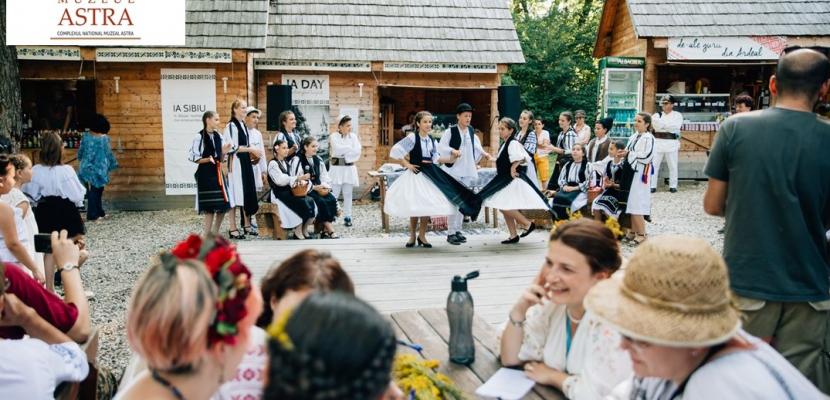Image

The Country Fair in ASTRA Museum
Published on 28 May 2020

Romania
Centru
This is the good practice's implementation level. It can be national, regional or local.
About this good practice
The Country Fair was inaugurated in 2012 as a result of CulinarCult project, a common initiative of Sibiu County Council and Ille et Vilaine Department, France.
Organized yearly in the assigned area in the open-air museum, it gradually grew from promoting local producers to showcasing the values of intangible cultural heritage of entire communities. The main stage is centered on the open kitchen which added value to the local ingredients and supports better transmitting the cultural context by interpreted live cooking. The guests are actively involved in interaction with the visitors and guided by the museum’s staff to present themselves in a new manner. Part of the concept of the fair is offering alternative importance to other traditional values as crafts and folklore, performed by the members of the guest community. By inviting communities, ASTRA Museum also intends to create a live invitation, a real business card of the community, redirecting visitors in their territory.
The main stakeholders of the program are the local communities, including small producers, rural guest houses and municipalities.
The main beneficiaries of the program are the visitors of ASTRA Museum, of which a special focus is placed on local families with small children.
Organized yearly in the assigned area in the open-air museum, it gradually grew from promoting local producers to showcasing the values of intangible cultural heritage of entire communities. The main stage is centered on the open kitchen which added value to the local ingredients and supports better transmitting the cultural context by interpreted live cooking. The guests are actively involved in interaction with the visitors and guided by the museum’s staff to present themselves in a new manner. Part of the concept of the fair is offering alternative importance to other traditional values as crafts and folklore, performed by the members of the guest community. By inviting communities, ASTRA Museum also intends to create a live invitation, a real business card of the community, redirecting visitors in their territory.
The main stakeholders of the program are the local communities, including small producers, rural guest houses and municipalities.
The main beneficiaries of the program are the visitors of ASTRA Museum, of which a special focus is placed on local families with small children.
Resources needed
Human resources:
- 3 curators
- 2 administrative staff
- 6 volunteers
Financial resources:
- Initial investment in the venue: 20.000 euro
- Annual maintenance costs: 1.500 euro
- Operational costs: 25.000 euro
- 3 curators
- 2 administrative staff
- 6 volunteers
Financial resources:
- Initial investment in the venue: 20.000 euro
- Annual maintenance costs: 1.500 euro
- Operational costs: 25.000 euro
Evidence of success
No. of editions (since 2012): 18
No. of communities invited: 16
8% increase on sales revenue from annual family tickets
Local and national media coverage: 15 articles / year, 3 national TV appearances (on average)
No. of communities invited: 16
8% increase on sales revenue from annual family tickets
Local and national media coverage: 15 articles / year, 3 national TV appearances (on average)
Potential for learning or transfer
According to the museum’s experience with similar cultural institutions throughout Europe, this practice is singular. The potential of replicating the experience in similar condition in other regions in very high as it does not imply a complex infrastructure and set-up.
The strongest impact of the learning experience is on the communities (marketing techniques and organizing skills), providing them at the same time a new perspective on their own values.
One common goal of the regions is identity building and community building that can be easily built around food and local culture. Our concept functions best in working on this goal with families with children, spending time outdoors.
Having access to first-hand knowledge about intangible cultural heritage of local communities in the premises of the museum, at hand for other researchers, is a plus for the organizing museum.
The strongest impact of the learning experience is on the communities (marketing techniques and organizing skills), providing them at the same time a new perspective on their own values.
One common goal of the regions is identity building and community building that can be easily built around food and local culture. Our concept functions best in working on this goal with families with children, spending time outdoors.
Having access to first-hand knowledge about intangible cultural heritage of local communities in the premises of the museum, at hand for other researchers, is a plus for the organizing museum.
Further information
Website
Good practice owner
You can contact the good practice owner below for more detailed information.
Organisation
ASTRA Museum

Romania
Centru
Contact
Executive Director